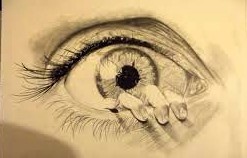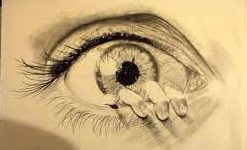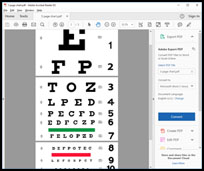Soon after I started vision improvement and began examining my feelings and habits surrounding my limited eyesight, I noticed the “reaching out” theme — I didn’t want to do it! Not with my eyes to see in the distance, nor with my personality to interact with others. On the rare occasions when I looked into someone’s eyes (I was usually looking down), it seemed the other person could see into my soul, and I felt totally invaded. Who wants that?
Reaching out to others, and welcoming them into my world, is a choice now, when I didn’t feel it was as a child. My little weak boundaries were invaded regularly and there was nothing I could do about it. No, I wasn’t beaten, but there was way too much of other people’s stuff coming at me, whether it be loud demands or “helpful” criticism or exasperated annoyance, for me to feel comfortable. I only felt safe when I was alone.

After spending many years interacting mostly with books and with computers in my small corporate cubicle, it started to dawn on me how cut off from others I was. When I began to improve my very strong nearsightedness, I quickly found this work was about a lot more than eye exercises. My intention to relax enough to welcome in the clarity was key. I had to want to see in the distance, to reach to meet that faraway image out the window, or that face across the room.
My years of energy medicine studies have taught me that most if not all physical problems have an underlying emotional component. And if we can heal the emotion, often the physical problem starts healing too. As I felt safer in small ways to reach out and interact with others, while practicing vision exercises to help my visual system improve the way I relax my eyes and focus, my eyesight gradually improved too.
In helping others improve their own eyesight, I’m repeatedly struck by the common themes, and also by how everyone is so unique. I think most vision problems arise from some flavor of not feeling it’s safe to see clearly. Yet where that belief came from is as different as our fingerprints. For one a serious childhood accident with an injury near an eye scared the visual system so much, it never felt fully safe to look again. “I never saw it coming!”. For another, sadness about the death of a friend, or overwhelm about all the school work when moving to a new grade, pushed someone into temporary myopia while trying to cope. Then being put in eyeglasses locked the condition into place.
The body and mind know how to heal, if we give them a supportive encouraging environment. This includes a positive grateful attitude. I don’t know you, but I’m willing to bet there’s a lot in your life which is going right. Most problems are not a disaster, and even little steps toward improving the situation can go a long way. I wore thick eyeglasses starting at 5 years old, then wore -10 hard contact lenses for decades, before I learned to improve my vision. My intention to heal led me forward, and my fumbling steps (and many missteps!) got me there eventually.
Yes, I am still timid sometimes, and may always like solitude more than most company. And I love my life with no barriers in front of my eyes, knowing it is safe to reach out as far as I want. There is so much to learn, and to enjoy! I can’t be part of the Dance of Life if I’m always sitting in the corner with my nose in a book. I challenge myself, gently, to keep improving, without overwhelming myself. Reaching out to make a new friend is practice for me. I notice how my vision feels safer and safer looking in the distance. I invite you to stretch yourself just a bit today, trying something new — this is how we grow.
I wore strong glasses, then contact lenses, from age 5 into my 40s. While making many mistakes, eventually l learned how to improve the way I use my eyes and to see in a more relaxed, healthy manner. It is my pleasure to coach others to do the same. Visit me at https://NancyLNeff.com.


Thank you, Nancy. Your posts work as a sort of spiritual mirror for me, they help me see my Self better… At a point in my life, I realized that my nearsightedness was a Self-protective mechanism, almost like a warning signal. When I strayed away from my authentic Self, my myopia and my astigmatism aggravated. I had to go back to what I really believed and enjoyed to improve my vision. Again, my thanks to you and please. keep sharing.
Oh dear Eva, thank you so much for writing, and what a compliment — I love the “spiritual mirror” idea! The more sensitive among us can feel overwhelmed pretty easily, wanting whispers when we’re being screamed at, so to speak. So we have to learn how to manage all the input. We have a lot to contribute, and can’t do that well if we’re in a high state of stress. Keep up the good work, and keep taking care of your precious self.
Sometimes in life it is strange.
The last weeks my vision is less than before and I don’t know the raison?
I have glaucoma and use eyedrops three times a day.
The eyepressure was oké last week but my Eyesight was less good than normal.
So in my opinion the eyepressure and Eyesight are not on the same level as I should think it has to be.
Now I am thinking if there was any important thing happende in my life because of the lower vision.
I feel anxious about this fact. What is happening in my eyes and I cannot do anything for betering besides exercises for eyes and good nutrition. There must be something else that is important for better Eyesight at least Eyesight that stays as it is.
What is the secret? Anyone?
Thank you.
Margriet
Margriet, hello and thanks for your comments. What may be getting ignored is the emotional component of restricted eyesight, how you feel about it. Some people can adopt healthier physical practices and see steady improvement. Others, often the more sensitive among us, may need to do some work to resolve stuck feelings, of grief, or resentment, or anxiety, to let the body’s energy flow more freely and the vision continue to improve. I’d invite you to do some journalling about this, to see what it uncovers. My holistic optometrist used to ask glaucoma patients “Where in your life is there too much pressure? In a job, or with a relationship, or somewhere else?”, and how that situation could be changed . He believed, and I do too, that the eyes are talking to us all the time. What might your eyes be saying to you?
Thank you Nancy. One Year has passed since and though aai have asked so may times for
answering , I still don’t know.
The only thing I know is the fact of my
emotional state has to do with the clearness
of my sight. And it is worsening every time
I get an emotional shock; how to prevent?
Hello Margriet. What continues to work to keep me balanced emotionally and seeing pretty clearly is threefold. First, I keep clearing that old negative stuff that happened when I was a child, so it doesn’t stay stuck in me and keep me from moving forward now. Second, I deal with new shocks to my system as they happen, so they don’t add to the pile of “bad stuff” and cause more grief or anger or fear. Finally, I see every day as a new chance to learn and grow, and actively look for what makes me feel good. We can’t prevent all shocks from happening, but we can often choose a more helpful reaction if we’re calm, then move past the trouble. Be kind to yourself. You are probably doing a better job than you think.
Nancy, this is a very beautiful story.
Thanks, Jeff! It’s good to her from you.
Nancy this is powerful information. I can relate. At 40 I had cataract surgery and then at 49 in my other eye. There was tons of stuff going on in my life that I had trouble seeing. Thank you
Linda, thanks. I’m sorry there were things in your life that were hard to look at back then, and I’m happy for your growing, and ongoing, awareness. Good for you!
Hi Nancy, I don’t comment often but enjoy your blogs, you always have something pertinent to say, thanks! I am also a Bates teacher, and I studied with Willeke and I have done some studies with Christopher, so I felt moved to write and check in with those two and with you. I thought by now I would have been sailing along with perfect vision, but I catch myself with the bad habits all the time. I think as a teacher, maybe its a good thing to struggle a little, it makes me dig deeper and learn more and then I have more of my own experience to share with the students. Thanks again, Lawrence.
Hello Lawrence, and thanks for commenting. I catch myself in bad habits often too. Just because we’re teachers doesn’t mean we’re perfect! I write about my vision experiences and thoughts to help me remember better what worked and what didn’t. Keep up the good work. We need a lot of Bates teachers!
I write about my vision experiences and thoughts to help me remember better what worked and what didn’t. Keep up the good work. We need a lot of Bates teachers!
Thanks, Nancy, it is like you say!
bye, Willeke
I recognize a lot, Nancy, in your blogs. Thank you for your articles.
I am a Batesteacher too, and still ‘in proces’
Yesterday for example I realized that a lot of time I ‘lock myslef up inside’, staring, because the visual sensory input is too weary for me at that moment. I am very sensitive ( sensory input), and also HSP. So I need enough rest too ‘open up’.
I think it is not only emotial luggage that gives the inner tension, but also the overload in modern world for sensitive people. I had a braininjury in mu youth. This kind of injury slows down saccadic eyemovements. That also is part of the game, not only emotions. I think it is important to discouver our own manual, how to keep in balance, each person in her own way.
Willeke, good for you for the work you are doing, both to help yourself, and to help others. Our challenges can make us wallow in feeling like a victim, or can motivate us to find a way to keep going, and thrive. Sounds like you’re doing exactly that. I’ll bet you help people as much by your good example and attitude as with your knowledge. Thanks!
Ah, yet again, Nancy, the insights you provide are as TIMELY as they are helpful and inspirational. My vision IS improving, little by little. Can’t begin to read without lenses, but my ability to see “things” at various distances is becoming clearer by some small amount each day.
Some days the clarity seems to regress, but as you have advised, vision is always responding to many factors – so rather than feel concern I just “keep the faith” and sure enough the next day, or later the same day the blur dissipates some.
TIMELINESS
I have to read an email response from someone I “reached out to” today in a personal way. The person is a stranger to me, and frankly, I’m apprehensive about opening the email (yeah, wuttadope). You’re RIGHT. My life and my ability/willingness to “venture out” have been repressed for decades, and it all started at the same time my vision difficulties did. What a valuable realization!
I absolutely trust your hypothesis; I prove it to myself daily. By the way, in one of your recent posts/articles you stressed the notion of “TEACHING your eyes that it’s good/fun/right to SEE” and I’ve kept that in mind on my vision walks, and in everything I do. It’s working. I’m experiencing actual improvement.
Throughout my time wearing glasses I’ve tried NOT to wear them unless necessary. Part vanity and part Intuition, I would say. In the process of avoiding my glasses I developed a bad habit of squinting through my eyelashes–which really DOES sharpen my focus– but it’s a crutch and has exacerbated my closing myself off and/or turning inward.
Thanks to what I’ve been learning this past year, and very much thanks to you personally, I’ve come to realize just how much squinting I’ve been doing – and with that Awareness I’m making progress in stopping it.
As always, thanks for what you do, Nancy.
Tom, congratulations! This is the way to improve, first becoming aware of and identifying those unhelpful habits, without blaming yourself — you adopted them trying to help yourself at some point. Then just keep gently doing something a little more useful now. And be sure to notice and praise yourself for improvements, however small. This is great! Thanks for telling us about it.
Thad, yes, a short cut would be nice! What works for me is gratitude for what I HAVE accomplished (I’m definitely not where I was!), and taking baby steps to keep going forward. Sometimes even a little bit more progress can be very satisfying, and can motivate me to do a little more.
What works for me is gratitude for what I HAVE accomplished (I’m definitely not where I was!), and taking baby steps to keep going forward. Sometimes even a little bit more progress can be very satisfying, and can motivate me to do a little more.
Staying focused requires courage. Focusing is not just a visual sense; it’s a base for mindful action, response or reaction; each has its emotional content from past memories. All 5 senses connect us to the “now” moment. Staying connected is the touch sense. Sounds are powerful and can’t be switched off. Covering the ears only sends us into the noises and circulating thoughts heard in the mind. Parenting can explore the street wise skills of each sense. Taste is to be savored – smells on readiness to eat or its past its sell by date. Knowledge is presented to each sense… clear mindful processed sensations connect us to personal memories, while thinking and analysis often leads to procrastination. However intuition provides a sure direct sense of presence and required action – often in great inspirational detail, the soul is fed by trust and hearts grow strong by reward for doing something anew. Habits bind us. Be free – relax – stay connected; witness the unfolding creation each moment of the day.
Christopher, yes. I have nothing to add, just thanks for your thoughts.
Absolutely! Well said, but courage to stay focused, seems fear driven. How to bridge the gap, allowing for mindful action, driving focus with confidence rather than courage. Courage, for me lends its self to crutches, corrected lenses, cautious behavior, habitsetc.; Resistance then builds, so every change, improvement is a new test, unnatural. More practice I guess, to develop the trust you describe, that’s necessary. I want a short cut, I guess !
!
Thad, yes, a short cut would be nice! What works for me is gratitude for what I HAVE accomplished (I’m definitely not where I was!), and taking baby steps to keep going forward. Sometimes even a little bit more progress can be very satisfying, and can motivate me to do a little more.
What works for me is gratitude for what I HAVE accomplished (I’m definitely not where I was!), and taking baby steps to keep going forward. Sometimes even a little bit more progress can be very satisfying, and can motivate me to do a little more.
“Physical problems have an underlying emotional component” that is my belief too.
The problem there for me is finding that component and though I do my very best I didn’t find it until now.
Thank you for the articles Nancy, I did read it with attention, very interesting!
Thanks, Margaret! More and more, this is the basis of my personal work, and my work with clients, whether they come to me for vision help or other issues. First we have to recognize the unhelpful pattern, then let go of blaming ourselves since we were doing the best we knew how at the time (and maybe it really wasn’t safe to see too clearly!), then learn new healthier ways to cope, embracing our adult power to choose. This is how we move ourselves forward, and the human race evolves.
Oh, and good for you about discovering the emotional component! I love it when I have a new insight, which to me is closely connected to eyesight. Keep up the good work.